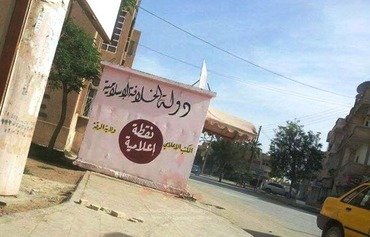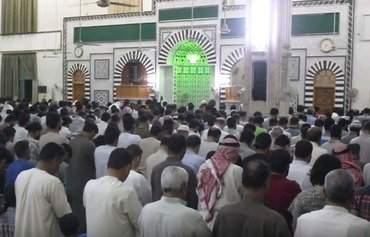Residents of the Syrian city of al-Raqa are suffering their third Ramadan under the rule of the "Islamic State of Iraq and the Levant" (ISIL), whose extremist ideology bans local social norms and deems them immoral.
The group is trying to obliterate the social customs people traditionally observe during Ramadan, compounding their misery, residents tell Al-Shorfa.
"For the third year now, I do not feel the joy of the holy month of Ramadan," said local merchant Wael Mustafa, who asked to use a pseudonym out of concern for his safety.
Ramadan has certain rituals that residents observe only during the holy month, he told Al-Shorfa, but they are now too costly and out of reach for most.
No one at the present time can afford the cost of the Ramadan banquets, which traditionally include a variety of dishes, he said.
Al-Raqa residents had been accustomed to exchanging invitations to iftar banquets throughout the month, he added, but this is no longer the case.
In the past, he recalled, the city would be teeming with shoppers during the day, purchasing pastries and sweets, produce and meat.
The city’s cafes used to remain open and were crowded until the time of suhour, Mustafa said, adding that things are different under ISIL.
"The city is now a ghost town, day and night," he said, with ISIL's television ban leaving residents with no means for entertainment during Ramadan.
The group has exacerbated the economic hardship many residents are facing by shuttering money changers, he added, putting residents who depend on remittances from family members abroad in a precarious financial situation.
Festivities deemed 'un-Islamic'
In previous years, the city’s merchants used to decorate the streets as an expression of joy over the holy month, said al-Raqa merchant Amjad al-Mohammad, who asked to use a pseudonym out of concern for his safety.
"But ISIL banned these rituals, saying they are bid'a (un-Islamic fads) that must be discontinued under the penalty of punishment," he told Al-Shorfa.
The group also banned the practice of closely observed religious rituals, he said, such as itikaf (spiritual retreat) in mosques to read the Qur'an, which is especially popular in the last 10 days of the month.
The warlike atmosphere prevailing in the city has made living there unbearable, he said, driving many residents to flee to the surrounding countryside.
The only people left in the city are those who cannot leave because they have no money and no relatives to go to, al-Mohammad said.
In addition to these restrictions and hardships, Ramadan is made more difficult with the "scenes of executions, crucifixions and floggings carried out by the group on a regular basis".
These punishments have increased recently, he said, with the most common charge leveled against the victims being collaboration with coalition forces.
Rising price of produce and bread
Food prices are high throughout the year because of the levies ISIL has imposed on truck owners and merchants.
But they rose even more with the advent of Ramadan, especially the prices of fruits and vegetables and the price of bread, said Hamad al-Matar, a street vendor who asked to use a pseudonym out of fear for his safety.
"Residents are facing an acute shortage of flour, which has provided ISIL an opportunity to boost its profits by inflating prices to the point where a loaf of bread has reached an unprecedented 50 Syrian pounds ($0.23)," he said.
With these prices, many residents cannot afford to purchase bread, he said.
Electricity also has become a rare commodity, he added, which has exacerbated the suffering of local residents with the onset of summer.

![A vehicle belonging to al-hesba, the 'religious police' of the 'Islamic State of Iraq and the Levant', patrols the streets of al-Raqa. [Photo courtesy of Syrian media activist 'Abu Sham al-Raqa']](/cnmi_am/images/2016/06/17/5617-Syria-raqa-hesba-600_384.jpg)






